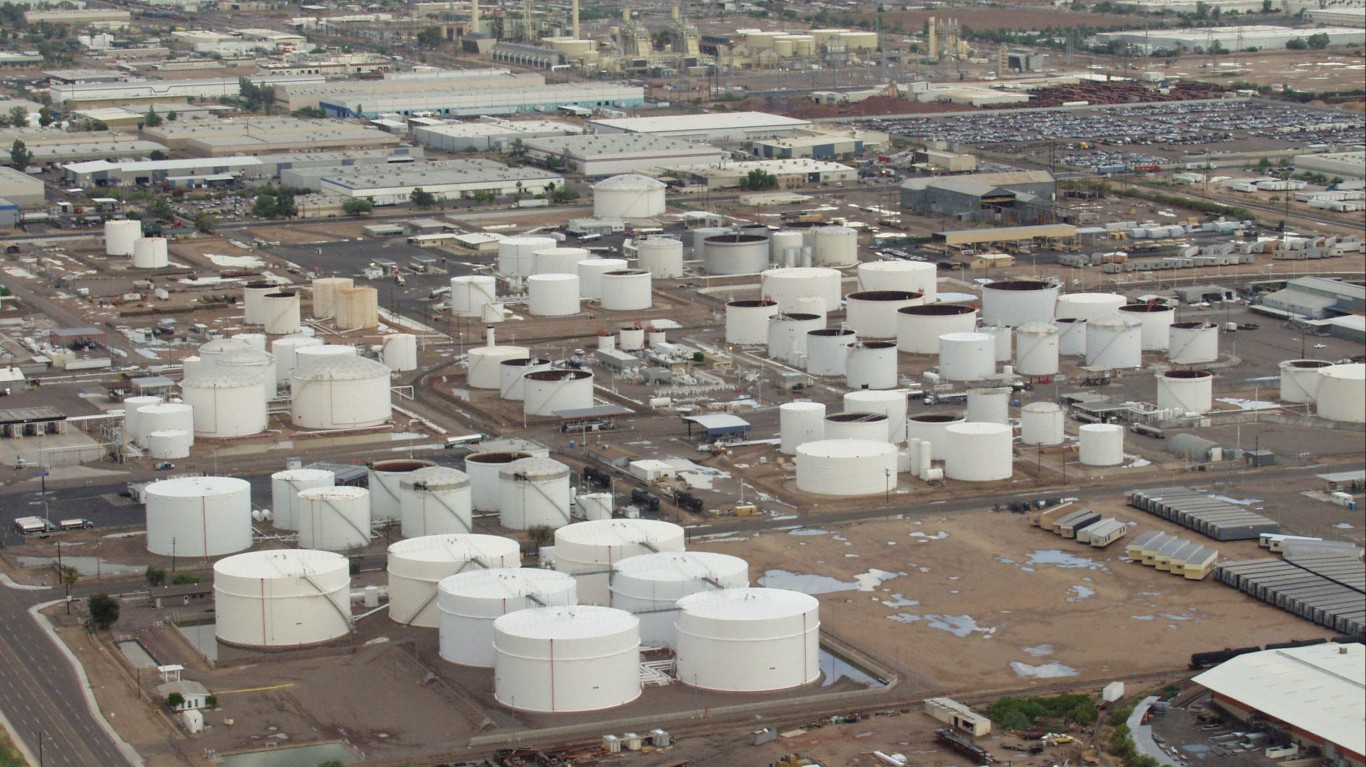Energy
Kinder Morgan Stock Reflects Sliding Debt, Higher Dividends

Published:
Last Updated:

Kinder Morgan Inc. (NYSE: KMI) reported fourth-quarter and full-year 2019 results after markets closed Wednesday. The midstream giant posted adjusted earnings per share (EPS) of $0.27 per share on revenues of $3.35 billion. In the same period a year ago KMI posted EPS of $0.25 on revenues of $3.78 billion. Consensus estimates called for EPS of $0.26 and revenues of $3.62 billion for the quarter.
For the full fiscal year, Kinder Morgan posted EPS of $0.96 and revenues of $13.21 billion compared with revenues of $14.14 billion and EPS of $0.89 in 2018. Analysts had forecast EPS of $0.96 and revenues of $13.58 billion.
In December, Kinder Morgan laid out its financial expectations for 2020. These include distributable cash flow (DCF) of $5.1 billion ($2.24 per share and up 3% year over year), raise its annual dividend from $1.00 to $1.25 beginning with the first quarter, and invest $2.4 billion in expansion projects and joint ventures.
Kinder Morgan also said it will pay its previously announced $0.25 quarterly share dividend out of net income totaling $610 million (up from $483 million in the year-ago quarter) and distributable cash flow (DCF) of $1.35 billion (up from $1.27 billion). For the full year, DCF totaled $4.99 billion, just a hair under the $5 billion the company had budgeted for 2019.
CEO Steve Kean commented:
We maintained our commitment to fiscal discipline by funding growth capital through operating cash flows, as we have been doing since the first quarter of 2016. Demonstrating this commitment is the fact that during the year we reduced our capital expenditures by more than $300 million, which overwhelmed the slight miss on DCF. … [O]ur net debt declined by almost $2.2 billion in the quarter and has now declined by more than $9.4 billion since the third quarter of 2015.
The DCF increase was the result of greater contributions from the Natural Gas Pipelines and Products Pipelines segments and lower preferred dividend payments, partially offset by lower commodity prices and volumes impacting our CO2 segment.
For the first quarter, analysts are looking for EPS of $0.26 on revenues of $3.44 billion. For the full year, estimates call for $1.02 in EPS and $13.86 billion in revenues.
Kinder Morgan shares have added about 22% since the beginning of 2019. Canada-based Pembina Pipeline Corp. (NYSE: PBA) in December paid about $1.55 billion for the U.S. portion of the Cochin Pipeline and also acquired all the outstanding equity of Kinder Morgan’s Canadian subsidiary in exchange for about 25 million Pembina shares. Earlier this month Kinder Morgan sold all its Pembina shares for after-tax proceeds of $764 million. The company plans to use the cash to pay down debt.
Shares closed down about 0.8% Wednesday at $20.96 and traded up about 0.6% at $21.09 in the after-hours session. Kinder Morgan’s dividend yield of 4.78% is holding up both its share price and its consensus price target of $22.22.
Credit card companies are at war. The biggest issuers are handing out free rewards and benefits to win the best customers.
It’s possible to find cards paying unlimited 1.5%, 2%, and even more today. That’s free money for qualified borrowers, and the type of thing that would be crazy to pass up. Those rewards can add up to thousands of dollars every year in free money, and include other benefits as well.
We’ve assembled some of the best credit cards for users today. Don’t miss these offers because they won’t be this good forever.
Flywheel Publishing has partnered with CardRatings for our coverage of credit card products. Flywheel Publishing and CardRatings may receive a commission from card issuers.
Thank you for reading! Have some feedback for us?
Contact the 24/7 Wall St. editorial team.